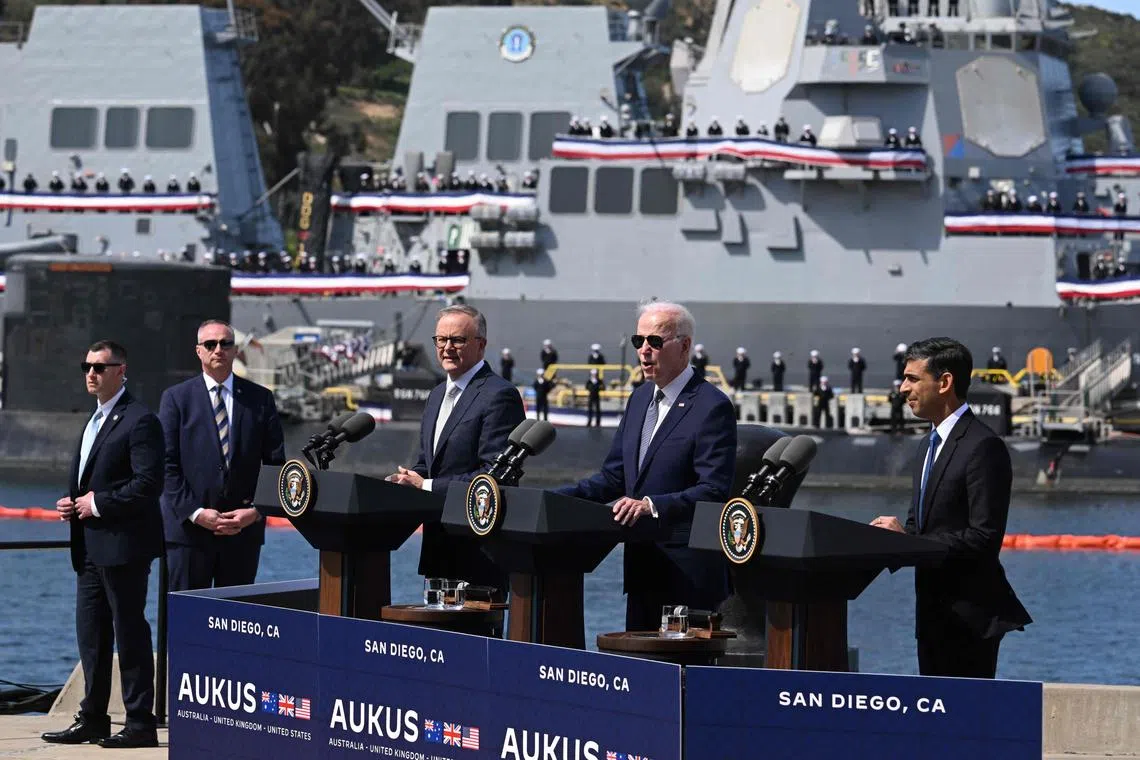Trump administration launches review of Biden-era Aukus defence pact with Australia, UK
Sign up now: Get ST's newsletters delivered to your inbox

There are vocal sceptics of the Aukus defence pact among US President Donald Trump's senior policy officials.
PHOTO: REUTERS
Follow topic:
WASHINGTON – President Donald Trump’s administration has launched a formal review of a defence pact that former president Joe Biden made with Australia and the United Kingdom allowing Australia to acquire conventionally armed nuclear submarines, a US defence official said.
Australia, which sees the submarines as critical to its own defence as tensions grow over China’s expansive military build-up, said it remained committed to the project and looked forward to working closely with the US on the review.
As well as causing alarm in Australia, the review could throw a spanner in the works for Britain’s defence planning. The Aukus pact, worth hundreds of billions of dollars
“We are reviewing Aukus as part of ensuring that this initiative of the previous administration is aligned with the President’s America First agenda,” the official said of the review, which was first reported by Financial Times.
“Any changes to the administration’s approach for Aukus will be communicated through official channels, when appropriate.”
Aukus was formed in 2021 to address shared worries about China’s growing power. It envisages Australia acquiring up to five US Virginia-class submarines from 2032.
Then Britain and Australia would design and build a new class of submarine with US assistance.
The UK would take first delivery in the late 2030s, with delivery to Australia in the early 2040s.
Before that, the US and Britain would start forward rotations of their submarines in 2027 out of an Australian naval base in Western Australia.
Vocal sceptics among Mr Trump’s senior policy officials include Mr Elbridge Colby, the Pentagon’s top policy adviser, who cautioned in 2024 that submarines were a scarce, critical commodity, and US industry could not produce enough to meet American demand.
Submarines would also be central to US military strategy in any confrontation with China centred in the first island chain, running from Japan to Taiwan, the Philippines and on to Borneo, enclosing China’s coastal seas.
“My concern is, why are we giving away this crown jewel asset when we most need it?” Mr Colby said in 2024.

A 2023 photo showing (from left) Australian Prime Minister Anthony Albanese, then US President Joe Biden and then British Prime Minister Rishi Sunak at a press briefing during an Aukus summit in California.
PHOTO: AFP
Only six countries operate nuclear submarines: the US, UK, Russia, China, France and India.
A spokesperson for Australian Defence Minister Richard Marles said the US had informed Australia and the UK of the review. “Aukus will grow both US and Australian defence industry, as well as generating thousands of new manufacturing jobs,” the spokesperson said.
A British government spokesperson called Aukus “one of the most strategically important partnerships in decades” that also produces “jobs and economic growth in communities across all three nations”.
“It is understandable that a new administration would want to review its approach to such a major partnership, just as the UK did last year,” the official said, adding that Britain will “continue to work closely with the US and Australia... to maximise the benefits and opportunities” of Aukus.
The White House did not immediately respond to a request for comment, but one official told Reuters that the Trump administration “is regularly reviewing foreign agreements to ensure they align with the American people’s interests – especially those initiated under the failed Biden foreign policy agenda”.
US Senator Tim Kaine, a Democrat on the Senate Armed Services Committee, said Aukus was “critical to ensuring a free and open Indo-Pacific”, and the administration should work to strengthen it and the US submarine industrial base.
“Anything less would play directly into China’s hand,” said Mr Kaine, who represents Virginia, where US submarines are built.
Australia’s biggest defence investment
Aukus is Australia’s biggest-ever defence project, with Canberra committing to spend A$368 billion (S$306 billion) over three decades for the programme, which includes billions of dollars of investment in the US production base.
On June 10, Britain announced plans to invest billions of pounds to upgrade its submarine industry, including at BAE Systems in Barrow and Rolls-Royce Submarines in Derby, to boost submarine production as announced in Britain’s strategic defence review.
Under this, it will build up to 12 next-generation attack submarines of the model intended to be jointly developed by the UK, US and Australia under Aukus.
In the US Congress on June 10, Defence Secretary Pete Hegseth said “we’re having honest conversations with our allies” and added in reference to Australia: “We want to make sure those capabilities are part of how they use them with their submarines, but also how they integrate with us as allies.”
Former Australian prime minister Malcolm Turnbull, who signed a previous agreement to acquire French submarines shelved in favour of Aukus, told CNBC last week it was “more likely than not that Australia will not end up with any submarines at all, but instead simply provide a large base in Western Australia for the American navy and maintenance facilities there”.
Aukus expert John Lee at Washington’s conservative Hudson Institute think-tank said the Pentagon review was aimed at determining whether it could afford to sell up to five submarines when it was not meeting its own production targets.
Ms Kathryn Paik, a Biden White House official now at Washington’s Centre for Strategic and International Studies, said providing submarines to Australia would not sacrifice US readiness, but instead boost collective deterrence.
“This review most definitely makes our allies in Canberra and London concerned, and could cause them to doubt US reliability as an ally and partner,” she said. REUTERS

